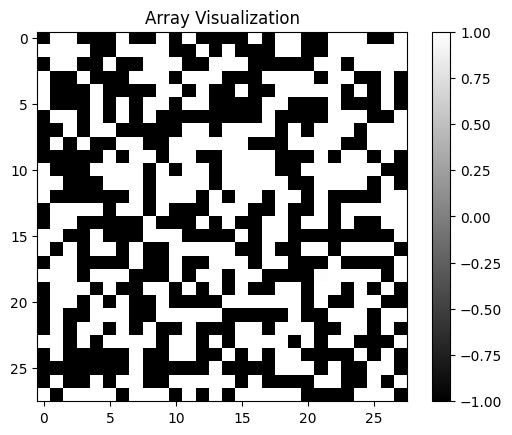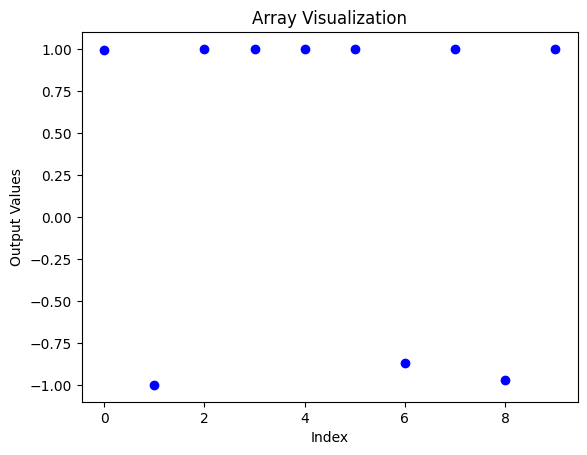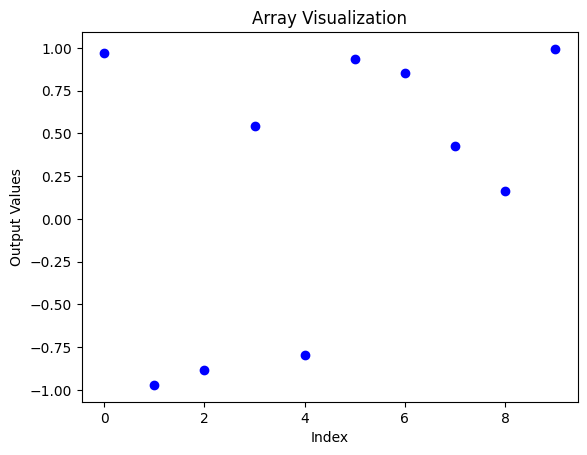
Amit
Posted on March 12, 2024
I am a noob don't learn from this. But Please point out my mistakes.
Mistake in Previous code I used class variable instead of instance variable.
import mpmath as mpMath
mpMath.mp.dps = 5
class Neuron:
def __init__(self,W):
# Weight is an vector.
self.W = W
self.B = np.random.uniform(-1, 1)
def forward(self,X):
self.wX = X.dot(self.W)
self.f_out = self.wX + self.B
return self.f_out
def tanh(self):
self.out_tanh = mpMath.tanh(self.f_out)
return self.out_tanh
neuron = Neuron( np.random.uniform(-1.,1.,size=(784,)).astype(np.float16))
class NLayer:
def __init__(self,input_dimension,number_of_neurons):
self.neurons = []
# A Layer have input and output dimensions.
# I am considering the neurons as output dimensions.
# and Input dimension will be the dimension/lenght of X like 784 in mnist data.
print(f'creating NLayer with {input_dimension} input dimension and {number_of_neurons} neurons \n')
self.num_of_n = number_of_neurons
self.input_length = input_dimension
for n in range(0,number_of_neurons):
# Initialze the weights and bias and create neurons
W = np.random.uniform(-1.,1.,size=(self.input_length,)).astype(np.float16)
self.neurons.append(Neuron(W))
def forward(self,X):
# print(f'Shape of X {X.shape}')
for n in range(self.num_of_n):
self.neurons[n].forward(X)
self.neurons[n].tanh()
# print(f'{len(self.neurons)}')
self.f_out = np.array([float(neuron.out_tanh) for neuron in self.neurons])
return self.f_out
# print(self.neurons[n].out_tanh)
def display_output(self):
# can be used when output dimension is a perfect square
grid_size = int(np.sqrt(len(self.f_out)))
image_matrix = np.reshape(self.f_out, (grid_size, grid_size))
plt.imshow(image_matrix, cmap='gray')
plt.colorbar()
plt.title("Array Visualization")
plt.show()
def display_output1(self):
indices = np.arange(len(self.f_out))
plt.scatter(indices, self.f_out, marker='o', color='b')
plt.title("Array Visualization")
plt.xlabel("Index")
plt.ylabel("Output Values")
plt.show()
print(indices.dtype)
# layer_1 = NLayer(784,784)
class NNetwork:
# A network have layers that
def __init__(self,input_dim,hidden_layer_dim_arr):
self.neuronsLayers = []
self.input_dim = input_dim
self.hidden_layer_dim_arr = hidden_layer_dim_arr
self.inputL = NLayer(input_dim,input_dim)
for d in range(0,len(hidden_layer_dim_arr)):
if d == 0:
self.neuronsLayers.append(NLayer(input_dim,hidden_layer_dim_arr[d]))
else:
self.neuronsLayers.append(NLayer(hidden_layer_dim_arr[d-1],hidden_layer_dim_arr[d]))
def train(self):
# update weights
pass
def test(self):
# Don't update weights. check weights.
pass
def predict(self,X):
self.inputL_out = self.inputL.forward(X)
# print(f'Forward out of Input layers is {self.inputL_out}')
self.inputL.display_output1()
for l in range(0,len(self.neuronsLayers)):
if l == 0:
self.neuronsLayers[l].forward(self.inputL_out)
else:
self.neuronsLayers[l].forward(self.neuronsLayers[l-1].f_out)
print(f'Forward output of layer {l} is :--> {self.neuronsLayers[l].f_out}')
self.neuronsLayers[l].display_output1()
def __str__(self):
print(f'Input Dimension {self.input_dim}. Hidden layer dim array {self.hidden_layer_dim_arr}')
return f'Neural Network with {len(self.neuronsLayers)} hidden layer'
nn1 = NNetwork(input_dim=784,hidden_layer_dim_arr=[10,10])
print(nn1)
nn1.predict(train_data[0])
Output of First layer(Input Layer).
The out-put is look like a number when I display forward out of neurons. The below output is tanh()

Output of 2 Layer

Output of 3 Layer

I think Now I should write my training method & how to update weights.
💖 💪 🙅 🚩

Amit
Posted on March 12, 2024
Join Our Newsletter. No Spam, Only the good stuff.
Sign up to receive the latest update from our blog.